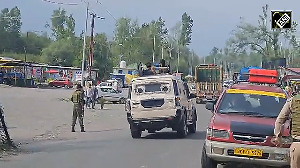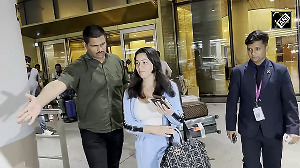A furious Taliban leadership has decided to send their fighters to Islamabad as a reaction to the army operations in the Swat valley on the troubled border with Afghanistan. The Taliban have already started painting walls in Islamabad with its threats, compelling the administration in the capital to erase these messages quickly.
Many religious scholars in Islamabad have received messages from the Taliban that they have only two options: They must support the Taliban or leave the capital else they will be considered collaborators of the 'pro-American Zardari government' which they consider not different from the previous Pervez Musharraf regime.
It is also astonishing that the Taliban in Swat and Bajour have included the names of some religious and jihadi leaders in their hit-lists only because they are not ready to fight against their countrymen.
The Taliban have accused some militant leaders in the tribal areas and some leaders of the Lashkar-e-Tayiba, the Harkat-ul Mujahideen and the Hizbul Mujahideen of trying to stop youngsters from fight against Pakistani forces. The Taliban have declared all these pro-Pakistan militants as their enemies.
It is learnt that the names of Maulvi Nazir from South Wazirastan, Hafiz Gul Bahadur from North Wazirastan, Lashkar founder Hafiz Mohammad Saeed, Maulana Farooq Kashmiri and Syed Salahudin of the Hizbul Mujahideen have been included on the Taliban hit-list. The Taliban have threatened some Hizbul Mujahideen leaders in Swat and Dir to leave the area soon.
Another Taliban leader in the Mehmand agency, Maulvi Omar Khalid, has threatened Lashkar militants to leave the tribal agency, because they were only interested in fighting foreign troops in Afghanistan or against India. According to Khalid, this meant they do not want an Islamic government in Pakistan.
This complicated situation has forced the Pakistan government to take some extreme steps against the Taliban in Darra Adamkhel and Swat. The Taliban killed Polish engineer Piotr Stannczak as a reaction to a big operation in the area. Some diplomatic sources have revealed that Pakistan was ready to release some arrested Taliban fighters in exchange for the Polish engineer and another kidnapped Chinese engineer, but the US raised some objections and the deal was not finalised.
The Pakistani authorities successfully negotiated the release of kidnapped Pakistani diplomat Tariq Azizudin in 2008 and the release of kidnapped army personnel in 2007 by releasing some Taliban fighters. This time, US pressure complicated the situation.
Though it confronts an East Pakistan-like situation from Darra Ademkhel to the mountains of Swat, the Pakistan army is not ready to surrender despite the fact that India is once again trying to exploit the situation by using threatening language against Islamabad. The Pakistan foreign office is under diplomatic pressure after the Polish engineer's brutal killing to 'do more' for the release of the kidnapped Chinese engineer, an Afghan diplomat, an Iranian diplomat and a UN diplomat kidnapped in Quetta, but the civilian and army leadership have decided not to bow down.
Reliable sources have revealed that kidnapped Chinese engineer Long Xiao is seriously ill in the Taliban's custody in Swat. He was kidnapped last August along with another colleague, Zhang Guo. Both men tried to escape. Long was injured and recaptured by the Taliban, but Zhang escaped. The Taliban want two dozen arrested fighters in exchange for Long, but the Pakistani authorities are not ready to accept this.
Afghanistan's Ambassador to Pakistan Abdul Khaliq Farahi was kidnapped last year and has still not been found. Some sources allege he was kidnapped over a personal issue at the behest of his in-laws. The Pakistani authorities are conducting a big search operation not only for him, but also for Iranian diplomat Heshmatollah Attarzadeh who was kidnapped from Peshawar last year.
After the army intensified its operations in Swat, half a million people out of the region's estimated 1.5 million population have left the area in the last month.
A top army officer linked with the operation in Swat said the "situation in Swat is much more complicated than East Bengal in 1971 where we were fighting against Indian-sponsored secular insurgents. The local population in East Bengal was fully supporting the insurgents, but the ground reality of Swat is very different. We are fighting the Taliban and they are demanding the enforcement of Islamic law in Swat and all the local political leaders are supporting this demand under public pressure."
North West Frontier Province Chief Minister Ameer Haider Hoti of the Awami National Party, Governor Awais Ghani and the army high command have strongly recommended that the fedaral government enforce long pending Sharia regulation, which will be called Nafaz-e-Adal regulation. Swat district police officer Dilawar Khan Bangash said the Taliban will have no justification to fight the state after the enforcement of Islamic law in Swat.
Swat was a princely state till July 28, 1969. The Islamic state of Swat was established in 1849 by Sayyed Akbar Shah. The state of Swat was kept in abeyance from 1863 to 1926, but Sharia law prevailed through Qazi courts during this period. The courts were restored by the British in 1926. Qazi courts operated till 1969 when Swat finally became part of Pakistan.
Residents of Swat think it was easy to get justice before 1969 through the Qazi courts, but after the imposition of Pakistani law, the poor do not get justice. The Taliban have exploited the delay in justice and instigated the poor to rise against big landlords.
The ANP swept the 2008 election with the slogan of peace and justice and now rules the NWFP in collaboration with the Pakistan People's Party. Reliable sources say the ANP leadership have convinced President Asif Ali Zardari to promulgate the Sharia regulation in Swat and the promulgation will be announced in a few days.
It is learnt that prominent rebel leader Maulana Sufi Muhammad of the Tehrik-e-Nafaze Shariat Muhammadi has assured the ANP leadership that he will start a long march from Dir to the Swat valley after the imposition of Sharia law. He will appeal to his son-in-law Maulana Fazalullah and other Taliban leaders to lay down their arms. He told ANP leaders that if the Taliban does not surrender its arms, then he will support army operations against them.







 © 2025
© 2025